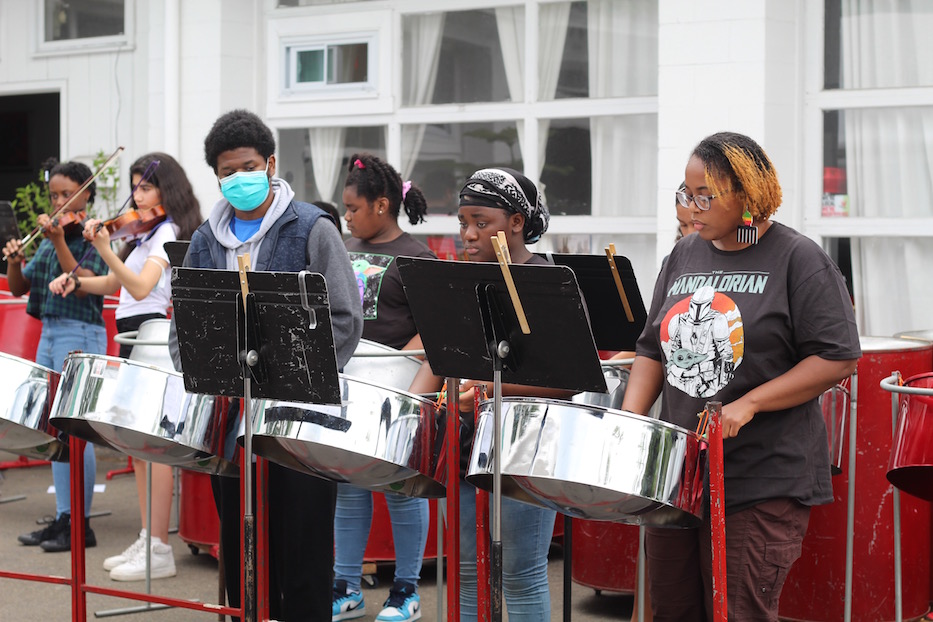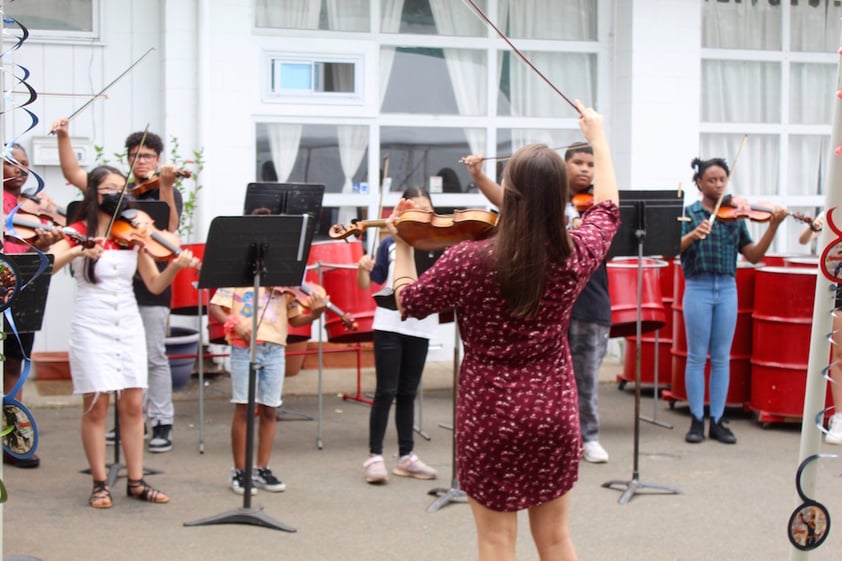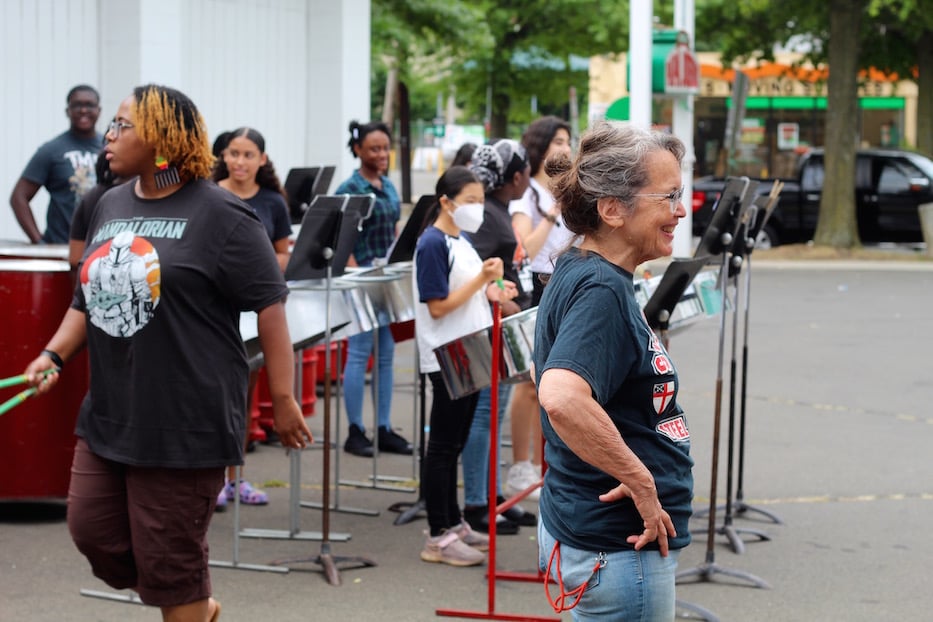
Music | St. Luke's Steel Band | Arts & Culture | Music Haven | Whalley/Edgewood/Beaver Hills | Arts & Anti-racism


Lucy Gellman Photos.
The pan rolled in first, laying down a low, rumbling carpet of sound that bloomed over the asphalt. Then the strings entered, shrill and succinct on top of them. In the audience, parents and siblings let the ringing pan envelop them. By the second measure, they were no longer in New Haven, but part of the Avengers’ sweeping quest to save planet Earth.
Music transported audiences last Saturday, as students gathered to celebrate the tenth annual St. Luke’s Strings and Steel Camp in the parking lot at 117 Whalley Ave. For a week, students and teachers have come together at the space—Music Haven’s former home—to learn three sci-fi and fantasy soundtracks on instruments that many of them have never played before.
In that time, they have learned theme music from Star Wars, Lord of the Rings and The Avengers, taking reading breaks with Edgewood book nerd Lauren Anderson and her dog, Sugar. Both are of the nascent bookstore venture Possible Futures.

Saleena Holder (at far right). Lucy Gellman Photos.
“I think my hope for them [the students] is really to explore a unique instrument,” said teacher Saleena Holder, who has been a general music educator at Conte West Hills Middle School for 10 years, a member of St. Luke’s Steel Band for eight, and taught at the camp for two. “You don’t have to know a lot about music to learn how to pan.”
The brainchild of St. Luke’s Steel Band Director Kenneth Joseph and Founder Debby Teason, the camp started in 2011 as a way for Music Haven students to learn about an instrument that was completely new to them, and made joyful, resonant magic when played alongside strings.
This year, teachers included Holder and Annalisa Boerner, a violist with the Haven String Quartet and resident musician with Music Haven.

Kenneth (Kenny) Fulton III and Reign Bowman. Lucy Gellman Photo.
Reign Bowman, a longtime violin student at Music Haven and 2022 graduate of New Haven Academy, came on as a teaching assistant. In just a few weeks, she heads to Southern Connecticut State University to study early childhood education. She praised the camp, in which she’s been a student, as a place to build relationships through music with the other students.
Saturday, those bonds were very much on display as students lined up behind the steel pans, ready to play the theme from Star Wars. As parents slipped into their seats and pulled out their phones to record, John Williams’ and George Lucas’ world of silky black skies, saber-wielding Jedis, doomed intergalactic love and starships hurtling through space came to life.
The sound wafted into the humid air and bounced over the warm asphalt and fading parking spaces. It undulated and bobbed and echoed around the space, sometimes as deep as belly laughter. Beneath a tent, Sugar found a sun-warmed spot to lounge and closed her eyes, as if she was doing close listening.

Lucy Gellman Photo.
“Some of these students, they’ve never played pan before, they’ve never played a string instrument before,” Holder said to cheers and applause between numbers. “So they have to learn how to play those instruments and play the songs that you’re hearing today, so I think they all did a really great job.”
That momentum carried through the pastoral “Song of the Shire,” as strings conjured wide-reaching, lush fields and sun-kissed hobbit huts that stretched for miles. Less than a minute in, they split into sections, eking out a harmony that swept upwards and swelled until it didn’t seem like the lot could contain it. By the third refrain, strings dipped and soared in unison.
It culminated in their performance of the theme from The Avengers, which has become synonymous with the superhero squad since Hollywood Records dropped it in 2012. As strings and steel stood side by side—a sight that New Haven hasn’t had for years—Yovanni Cruz looked over at his fellow musicians, and then out at the audience.

Debby Teason (in jeans). Lucy Gellman Photo.
“Avengers!” he half-shouted, counting musicians in. Steel took the lead, the sound building deep in the metal, scalloped pans. Just seconds later, strings swept in. Instead of Alan Silvestri’s bombastic, high-stakes score, the sound translated as a heartbeat, then a chorus of bells. Strings broke back in, upping the ante. Pan responded, the sound round and deep. When the two finished in lockstep, the audience burst into applause.
Boerner, who has taught at the camp for six years, called arranging the music with Holder and Teason one of the most fun parts of preparing for the camp. As she buzzed between families after the concert, she added that she keeps coming back not just for the students, but also for herself.
“It keeps my rote beginner skills expertly sharp,” she said. “As a teacher, it’s a very helpful process.”

It’s one of her favorite parts of the year—although she’s still waiting for the chance to learn to pan herself. At one point Saturday, she said, she looked over and was thrilled to see that the string students didn’t need her help counting rests, because they were keeping count themselves.
She called it a chance for students to hone their ensemble skills and, for some, return to Music Haven stronger in the fall.
“My dream is that when they come back in the fall, they’re still playing the tunes,” she said.
Nibbling sprinkle-flecked, neatly iced donuts after the performance, students Cruz and Kevin Witherspoon both said they had taken the week as a learning experience. For Kevin, a rising seventh grader at Wexler Grant School, the pan was a completely new instrument after years with both the violin and the guitar. As he spoke, he inspected a thick, uniform crust of pink frosting that was crackling in the heat.
“It teaches me more respect for instruments I’ve never heard of before,” he said.
A rising sophomore at Wilbur Cross High School, Cruz has been with Music Haven for several years, and said he was excited for the opportunity to join the camp. He’ll take many of the lessons he’s learned—like when to listen, and when to come back in—into his everyday life.
“It taught me how to balance the way you play instruments and it taught me how to lead,” he said. “It’s like, every time you do a concert, it builds up your confidence to be in front of people.”

Theodore "Teddy" Felton, Kenneth Felton III, and Gillian Redeaux. Lucy Gellman Photos.
Every so often, a student would forget what they were doing and follow Sugar—the real star of the week, Holder joked to laughter—over to another corner of the lot. A few pint-sized listeners stayed around to pet her as their older siblings helped roll the steel pans back into the church and take down a tent that had shielded people from the sun.
One of them, Kenneth Felton III, said he’d been thrilled to hop on as a camper. He spends summer in New Haven with his grandmother, Gillian Redeaux, who attends St. Luke’s.
As he grabbed a tent post, he counted the number of years he’s attended the camp, and played in St. Luke’s PANatics because he loves the pan so much. While he lives in Lansdale, Penn. during the year, Felton travels to New Haven each summer to visit Redeaux, who hails from Saint Kitts. She has been a parishioner at St. Luke’s for over three decades—since she arrived in New Haven from the Caribbean island where she was raised.
“I’m a music person, so I really enjoy it,” he said.

Lucy Gellman Photo.
The camp also connects students to a history of freedom much bigger than themselves, and the small city in which they are learning to play music. In the first half of the twentieth century, the steel pan tradition grew out of an oppressive, then-still-colonial government in Trinidad and Tobago, where free, formerly enslaved Black people were largely limited in what percussion instruments they could play.
In the 1930s—three decades before formal independence from the British crown—people began using the concave metal bases of oil drums to create percussive sound. What began out of necessity stuck: steel pans are now a widely used and celebrated art form, with voices that ring and jingle like laughter depending on how the mallets hit the scalloped edges of each pan.
There’s a history of diaspora and resilience there, and it comes out every time students pick up their sticks and begin to play. The sound has also become a hallmark of St. Luke’s, where much of the congregation hails from the Caribbean.
Joseph, who founded the camp, said he was immensely proud to watch it continue to grow, particularly in the third year of the pandemic (there are two sessions this year, to allow for smaller groups and less risk of Covid-19 exposure and infection). When he hears the pan, he hears the sound of history, and of home.
“It’s important for me on a personal note because of where the tradition comes from,” Joseph said. “The men who have come before me … people have fought, people have died for me, for the pan to be here. When you play, it’s just a joyous feeling.
Learn more about St. Luke’s Steel Band here. Learn more about Music Haven at their website.

